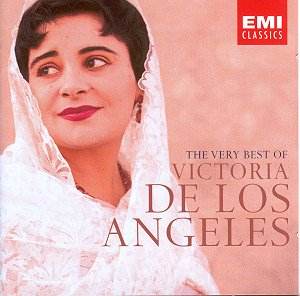




CD1
Giacomo PUCCINI (1858-1924)
Gianni Schicchi, ‘O mio babbino caro’
Madama Butterfly, ‘Un bel di vedremo’
La Boheme, ‘Sí Mi chiamano Mimi’. (mono)
Suor Angelica, ‘Senza mamma’
Pietro MASCAGNI (1863-1945)
Cavalleria rusticana, ‘Voi lo sapete, o mamma’. (mono)
Ruggero LEONCAVALLO (1858-1919)
Pagliacci, ‘Hui! Stridono lassú’.(mono)
Alfredo CATALANI (1854-1893)
La Wally, ‘Ebben? Ne andro lontana’. (mono)
Gioachino ROSSINI (1792-1868)
La Cenerentola, ‘Necqui all'affano ..., Non più mesto’. (mono)
Il barbiere di Siviglia, ‘Una voce poco fa’
Giuseppe VERDI (1813-1901) La Traviata, ‘É strano!…Ah, fors’ é lui ... Sempra libera’
Wolfgang Amadeus MOZART (1756-1791) Le nozze di Figaro, ‘Porgi, amor’. (mono)
Richard WAGNER (1813-1883)
Tannhäuser, ‘Dich, teure Halle’ (mono)
Lohengrin, ‘Einsam in truben Tagen’ (mono)
Jules MASSENET (1842-1912) Manon, ‘Adieu notre petite table’. (mono)
Charles GOUNOD (1818-1893) Faust, ‘Ah! Je ris’
Georges BIZET (1838-1875) Carmen, ‘L’amour est un rebelle’ (Habanera)
CD2
Felix MENDELSSOHN (1809-1847) ‘Auf Flugeln des Gesenges’
Edvard GRIEG (1843-1897) ‘Ich Ifebe dich’
Johannes BRAHMS (1833-1897) ‘Wiegenlied’
Leo DELIBES (1836-1891) ‘Les filles de Cadiz’
Xavier MONTSALVATGE (1912-2002) ‘Cinco canciones negra’
Manuel De FALLA (1880-1942) El amor brujo, ‘Cancions del amor dolido’ and ‘fatuo’
Joseph CANTELOUBE (1879-1957) Chants d'Auvergne; ‘La pastoura’, ‘Bailero’, ‘Chut, chut’, ‘Uno jionto’
George Frederic HANDEL (1685-1759) Joshua, ‘Oh! Had I Jubal’s lyre’
Franz SCHUBERT (1797-1828) ‘An die Musik’
Johannes BRAHMS (1833-1897) ‘Vergebliches Ständchen’
Henri DUPARC (1848-1933) ‘L’invitation au voyage’
Maurice RAVEL (1875-1937) Shéherazade: ‘La Flute enchantée’; ‘Chants populaires’
Joaquin VALVERDE (1846-1910) ‘Clavelitos!’
Joaquin NIN (1879-1949) ‘Malaquena’. ‘Granadina’
Tomás BARRERA (1870-1938) and Rafael CALLEJA (1874-1938) ‘Adios, Granada’
Gerónimo GIMENEZ (1854-1923)
La Tempranica, ‘Zapateado’
Bargain price
BUY NOW
Crotchet AmazonUK AmazonUS